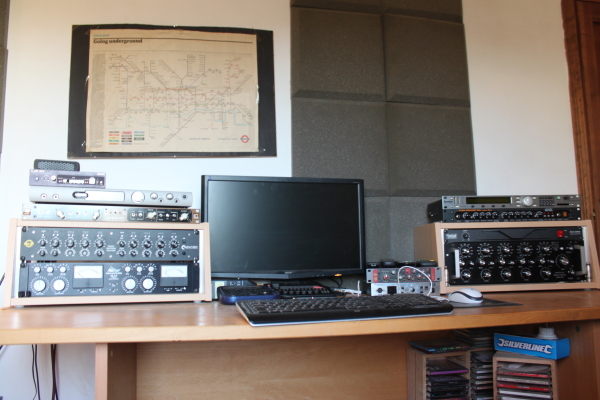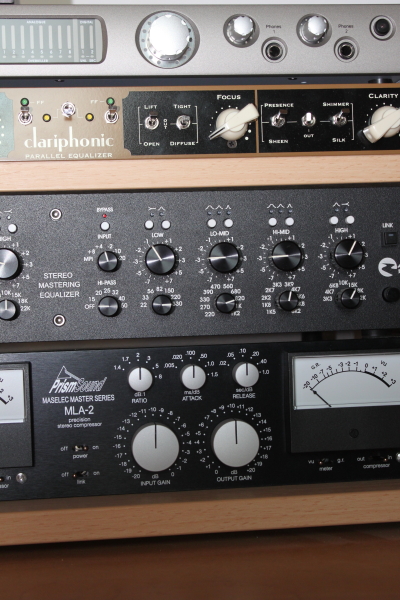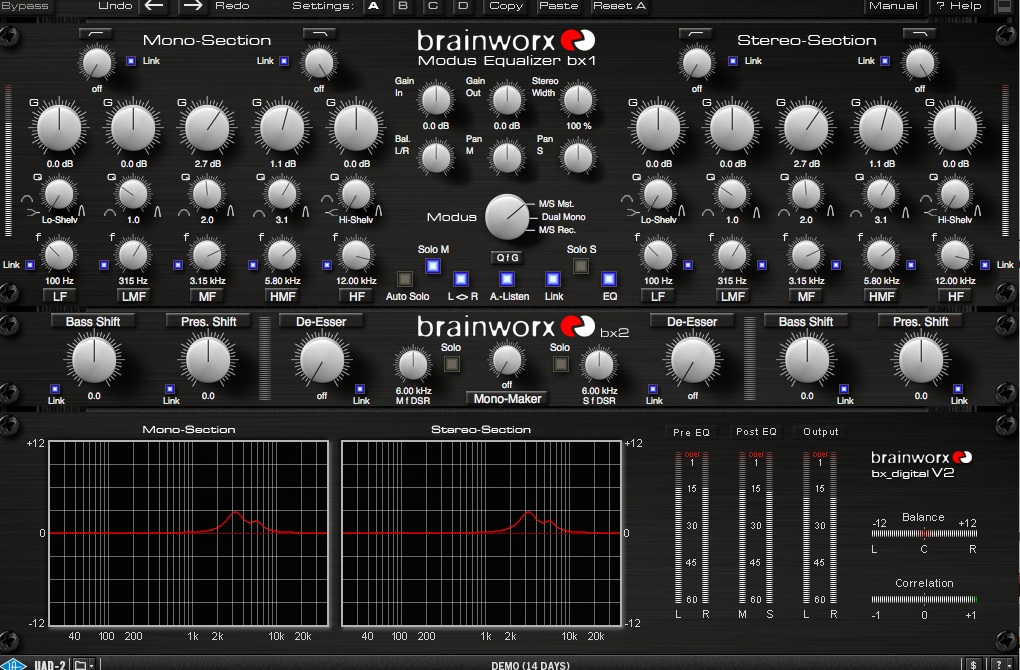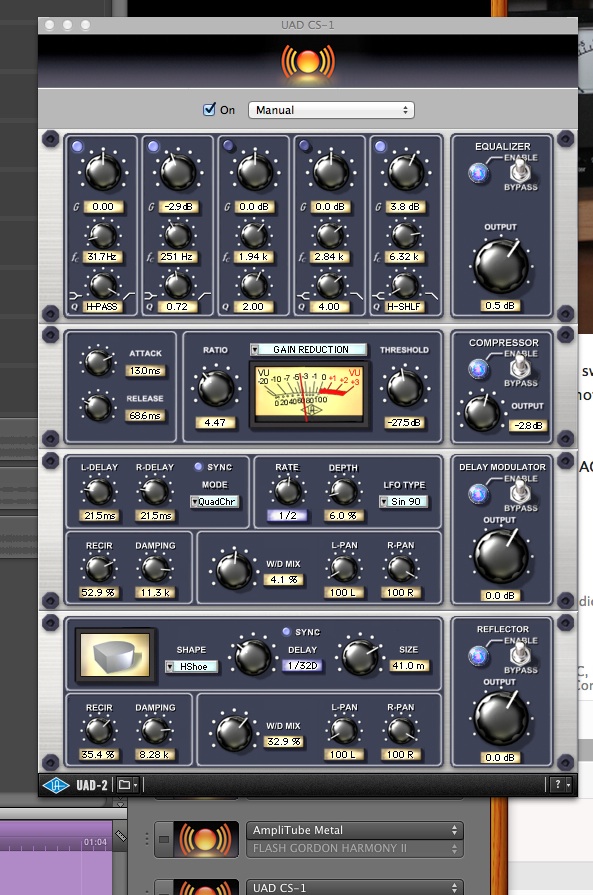Printable Version of Topic
Click here to view this topic in its original format
GMC Forum _ Recording _ Sneak Preview
Posted by: tonymiro Mar 28 2012, 11:32 AM
It's that lovely time where my mastering studio is approaching the end of the finacial year and so we're looking at equipment purchases. A couple of you know that we've spent the last few months trialing out a number of different compressors as an alternative to our hardware VCA comp. Well we're nearly there now and have reduced the list to two optical compressors:
http://www.prismsound.com/music_recording/products_subs/mla2/mla2_home.php
or a
http://www.mil-media.com/tcl-2.html
Price here isn't really an issue as both are $5000, give or tke a few hundred. An opto compressor would be a nice addition/alternative for us as they tend to be very musical and are particularly good on vocals, bass and guitar. Optos sometimes are a bit slow to cope with very fast transient attacks though these two seem ok and if they can't then the VCA is there.
I'm probably going to have a few sleepless nights deciding between the two as they're both rather special for what they can do to a master but at the moment we're edging towards the Maselec.
We're also looking at buying a http://www.kushaudio.com/kush/clariphonic/index.html .
The Clariphonic is a parallel EQ that operates as a kind of Baxendale shelving filter and so it would sit alongside our two current mastering EQs, the great River MAQ2NV and our Gyratec XIV. The Clariphonic is about $2500.
Posted by: The Uncreator Mar 29 2012, 12:45 AM
Uhhg, dont want to know the price but the Maselac sounds great from the page.
How exactly do you use these? I know software you simply load the effect in your chain, but with hardware how can you actively apply this to multiple tracks? Wondered about this with hardware in general, like how do your EQ settings preserve themselves? does it have software it coincides with?
Posted by: thefireball Mar 29 2012, 05:04 AM
I want to know too. ^^
Posted by: tonymiro Mar 29 2012, 12:29 PM
How exactly do you use these? I know software you simply load the effect in your chain, but with hardware how can you actively apply this to multiple tracks? Wondered about this with hardware in general, like how do your EQ settings preserve themselves? does it have software it coincides with?
It partly depends on the console/desk that you use i.e. whether it's split or in-line and whether you go pfl or afl. The general technique in mixing is that they are applied as an insert on the appropriate channel. Very often in mixing you need to place a specific comp on a specific instrument - so you might need a fast VCA type comp on a snare drum and an opto on a male lead vox. Similarly you may be using mono hardware for mono tracks and stereo/linked hardware for stereo tracks. That's a big reason why a pro mixing studio has lots of hardware - so that they can use the most appropriate. If you want the same comp or effect on more than one channel then you bus that to a group and insert to the group. In these instances the hardware can get away, to some extent, with having less finesse then what you need on the stereo main for mastering as you are not trying to make adjustments that affect the entire mix. In mastering the majority of eq/comp etc that we do is on the stereo main and there's no real need for a console but you need hardware that can operate as linked stereo. Occassionally you might need to go via a M/S encoder and then to the hardware and back and occassionally you might sum if you are doing stem mastering.
With recall - the hardware in mastering are not continuous but tend to be 'detented' i.e. when you turn a gain knob, for instance, it will click between a given number of positions each of which will be +/- a specific change in dB. So when I apply a -2.5 dB on a Q of 2.4 at 270 Hz all of those are detented and precise - on continously variable settings all of your settings are a bit hit and miss. In mastering you can note down the detented positions etc on a recall sheet or take a photo etc of how the exact hardware settings. As the knobs etc are detented you can then recall the precise settings. If I had to I could reset equpiment to the recall sheets for mastering sessions done in the past to replicate how the chain was set up.
(There a small number of outboard hardware though that are digital and which therefore allow you store and load recall positions. The vast majority of hardware though isn't digital.)
With software vsts - the two advantages are
1/ you can use multiple instances of the same vst. That's more useful in mixing then mastering as you might need to use the same comp on several different channels at the same time but with different settings. A pro mixing studio would of course have more than one hardware comp though so it's not that big an advantage. Mastering - not really an advantage as it's extremely rare that you'd need two instances of the same actual compressor - with instances of serial compression/limiting you are more likely to use different comps/limiters to get finesse and colour.
When you use multiple instances/multiple vsts you need to be aware of any unwanted side effects due to load on your processor and of other possible issues with vsts related to artifacts, unwanted colourations, distortion, phasing and ringing, any failure to null properly, poor internal summing and so on. Properly designed and gain staged hardware has already dealt with these.
2/ recall - you can store and recall your own and preset settings and so build up a library of them. Not so much of an advantage in mastering (at least for me) as I reset to zero for all new sessions and don't use presets.
Ultimately for me as a mastering engineer the pro end hardware wins because:
1/ it sounds better because it imparts musical colour then the software (and that includes all the emulations of specific hardware units).
2/ It lends itself to proper gainstaging and level control.
3/ It tends to lend itself to being driven in to the red so you can get more level/gain without nasty distortion.
4/ Phasing, ringing etc are not likely to be an issue at all.
5/ It's nicer to use then software.
Posted by: The Uncreator Mar 30 2012, 12:30 AM
Awesome info as always. Plus, it looks way cooler. I always wanted to get a good external EQ that I can use on mastering tracks, something basic that will teach me a bit more than a vst emulation will.
Posted by: tonymiro Apr 6 2012, 03:33 PM
A standard mix eq would cost a lot less but they're not really up to mastering at all - slopes, filters and gain/attenuation all tend to be too extreme. If you're happy though to experiment with an eq either on specific tracks/2 bus for mixing this could still teach you a lot though - and for a lot less. Good hardware eqs here would include Neve, SSL, Empirical, Charter Oak, Mercury, Great River, Millenia and so on.
One possible thing to consider is to get an http://www.apiaudio.com/5006b.html , or similar, and you can then add small individual units (EQs, compressors, preamps...) to it as you want/need. The units don't have to be API - Millenia, Great River, Elysia and many other well respect hardware makers all make units for it. Still not cheap - about $500 for the empty lunchbox and each unit tends to be around $400-900 - but it would maybe allow for more experimentation with pro end gear and allow you to add to it as you went along.
Mastering quality EQs aren't cheap I'm afraid. Most are around $5000 or more although if you look around it is possible to find some of the less transparent type for less. Of those a good start would probably be the API 5500 - it's about $2.5k new. Another possibility would be the DAV electronics BG3 - in the UK that's @£1200, not sure what it might sell for in the US though. Alternatively you can sometimes find used/2nd hand units but you'd need to be careful as some might not have been looked after particularly well and might end up costing more than it's worth to sort out.
Posted by: The Uncreator Apr 6 2012, 10:33 PM
These prices hurt me ![]()
But it is something I would want to learn. So the investment when I have the spare cash will probably be made. I was figuring $1,000 for a decent one, then $3,000 or so for high end, but I guess once I am doing that much $5,000 is understandable.
Posted by: tonymiro Apr 7 2012, 03:31 PM
But it is something I would want to learn. So the investment when I have the spare cash will probably be made. I was figuring $1,000 for a decent one, then $3,000 or so for high end, but I guess once I am doing that much $5,000 is understandable.
You might get lucky and find one on Ebay for between $1-3k - just be very careful though that it's in good condition and not a scam.
It's also possibly worth getting on the mailing lists of some of the high-end dealers as they also sometimes have ex-demo and used mastering hardware. http://www.mercenary.com/newgear.html are one of the pro studio gear dealers in the US but there are a few others. A few hardware manufacturers will also sell direct but most will refer you to their dealers.
Other things to think about - it's not just a case of getting a mastering EQ, you also need to be able to get the signal in and out of it at a high enough quality, properly gain-staged and be able to hear what you are doing accurately. All of which means that getting in to mastering with hardware isn't cheap. Just for learning - it would be more economic to stay ITB and put the money in to a good monitoring chain and some of the better software EQs vsts like the Flux EPure and Algorhythmix Red or Orange. If you needed hardware whilst you did something like this you could always look into hiring the hardware or renting studio time.
Posted by: tonymiro Jun 1 2012, 12:42 PM
We finally decided to go with the Maselec MLA-2.
We actually came to that decision a few weeks ago but our accountant made a mess of the money transfer and exchange twice and had to do it over, which took quite a while. Anyway, the order has now gone in and we should hopefully receive it in a few weeks.
Posted by: Todd Simpson Jun 2 2012, 05:30 AM
Congrats! Post some pix and audio when you can ![]()
We actually came to that decision a few weeks ago but our accountant made a mess of the money transfer and exchange twice and had to do it over, which took quite a while. Anyway, the order has now gone in and we should hopefully receive it in a few weeks.
Posted by: tonymiro Jul 6 2012, 08:32 PM
The Maselec MLA-2 arrived this afternoon. Here's a couple of (not very good) photos of it:
In situ with most of our other mastering outboard hardware. There's a few other outboard units that aren't in photo but those that are tend to be our 'go to' items.
A close up of the RHS channel of the MLA-2
Mastering wise one of the things to note is that 3 of the switched ratios are 2 or lower. Mixing/recording comps tend to put the emphasis on the higher ratios. You can't tell from the photos but all the controls are detented and/or switched and so fully recallable.
You can also see some of the detail of our Great River MAQ EQ and Prism Orpheus here.
Posted by: Todd Simpson Jul 7 2012, 06:55 AM
Spiff! I"ve recently added to "Hardware Assisted" EQ's to my rig and wanted to ask if you had tried them? They are Universal Audio plugins and use a dual processor external "Satellite" unit as dedicated hardware processing. I've been really amazed at the quality and was really suspect at first. I've got "VST" / "Software Only" versions of the same/similar plugins and they just don't sound as good so the UAD hardware is doing something, I am just not sure what.
The first is the BRAINWORX MODUS
and the UAD CS1
Posted by: tonymiro Jul 7 2012, 10:45 AM
...
I've never used either Todd so can't comment specifically.
Mixing vsts and mixing hardware are usually just too broadbrush to have the finesse for mastering. As an example about 70% of our use of a compressor focuses on ratios at or below 2:1; in mixing 90% uses ratios above 2:1. If you look at the MLA2 and the UAD comp they reflect these different needs: the MLA has about 50% of its range at 2:1 or lower whilst the UAD has about 90% of it's range at and above 2:1. I think the UAD would be great for mixing but just not for me for mastering.
Brainworx have been on to us a few times to use/promote their stuff. I do know of a few mastering engineers who use Brainworx stuff but we just don't really have a need here as we can replicate what their vsts do with hardware reasonably easily. Generally Brainworx have quite a good reputation for quality and functionality - particularly as a lot of their vsts include MSDs or some variation on that. I think they see mid side decoding/encoding as their USP. MSD can be very useful on problem mixes but its also easy to destroy the cohesion of a mix if you overdo it. Anyway I'm sure it's a good vst provided you're conservative with the controls and do sufficient A/Bing.
UAD - again generally has a good reputation in recording and mixing. A UAD card in a pc can also be good if you need the extra processing - not really an issue here though. They are also supposed to be good at emulating some original hardware units like Pultecs etc if you're after that kind of thing.
With the UAD hardware Satellite again I've not come across it so can only guess. It may be the case that the difference is just that analogue is perceived as more musical than digital due to the differences in distortion. There's a long on-going argument about using analogue summing mixers with DAWs to achieve/improve musicality. So the UAD Satellite may be working around this analogue is more musical bit. Alyernatively one of the major pluses of good hardware is that it helps maintain stereo width and depth. Software vsts have a tendency to narrow the width. The Satellite might be trying to achieve/maintain stereo soundstage though by altering the phase of the signal subtly and adding some distortion in much the same way that a lot of exciters/expanders do. If it's done carefully it could be good on some mixes but I think that you'd need a lot of control to make sure it didn't introduce problems.
Posted by: Todd Simpson Jul 11 2012, 04:07 PM
Gotcha. I'm not sure what the UAD is doing precisely, but it does sound pretty spiff so far. I keep thinking they could just use in board CPU processing and skip the card/satellite but they have not listened yet.
It's doing something though. I've tried the SSL native plugs and the SSL UAD plugs and the UAD seem to have more musicality/clarity/warmth. Perhaps they doing some crazy oversampling? Not sure but I"m liking it so far. Just wish they could skip the box and use one of the four CPUS inside the rig.
Todd
Mixing vsts and mixing hardware are usually just too broadbrush to have the finesse for mastering. As an example about 70% of our use of a compressor focuses on ratios at or below 2:1; in mixing 90% uses ratios above 2:1. If you look at the MLA2 and the UAD comp they reflect these different needs: the MLA has about 50% of its range at 2:1 or lower whilst the UAD has about 90% of it's range at and above 2:1. I think the UAD would be great for mixing but just not for me for mastering.
Brainworx have been on to us a few times to use/promote their stuff. I do know of a few mastering engineers who use Brainworx stuff but we just don't really have a need here as we can replicate what their vsts do with hardware reasonably easily. Generally Brainworx have quite a good reputation for quality and functionality - particularly as a lot of their vsts include MSDs or some variation on that. I think they see mid side decoding/encoding as their USP. MSD can be very useful on problem mixes but its also easy to destroy the cohesion of a mix if you overdo it. Anyway I'm sure it's a good vst provided you're conservative with the controls and do sufficient A/Bing.
UAD - again generally has a good reputation in recording and mixing. A UAD card in a pc can also be good if you need the extra processing - not really an issue here though. They are also supposed to be good at emulating some original hardware units like Pultecs etc if you're after that kind of thing.
With the UAD hardware Satellite again I've not come across it so can only guess. It may be the case that the difference is just that analogue is perceived as more musical than digital due to the differences in distortion. There's a long on-going argument about using analogue summing mixers with DAWs to achieve/improve musicality. So the UAD Satellite may be working around this analogue is more musical bit. Alyernatively one of the major pluses of good hardware is that it helps maintain stereo width and depth. Software vsts have a tendency to narrow the width. The Satellite might be trying to achieve/maintain stereo soundstage though by altering the phase of the signal subtly and adding some distortion in much the same way that a lot of exciters/expanders do. If it's done carefully it could be good on some mixes but I think that you'd need a lot of control to make sure it didn't introduce problems.
Posted by: tonymiro Jul 12 2012, 12:41 PM
It's doing something though. I've tried the SSL native plugs and the SSL UAD plugs and the UAD seem to have more musicality/clarity/warmth. Perhaps they doing some crazy oversampling? ...
Todd
Yes it probably is oversamplng Todd, though I'd guess it's more likely to be 2x than the oversampling rates of a mastering AD/DAC. If it is oversampling the warmth may actually be ripple distortion on the filter. SSL aren't really a console that I'd associate with warmth to be honest. I always associate SSL more with an 80s/90s type vibe and clarity/coolness, which I like as I spent a lot of time on big SSLs
Powered by Invision Power Board (http://www.invisionboard.com)
© Invision Power Services (http://www.invisionpower.com)
